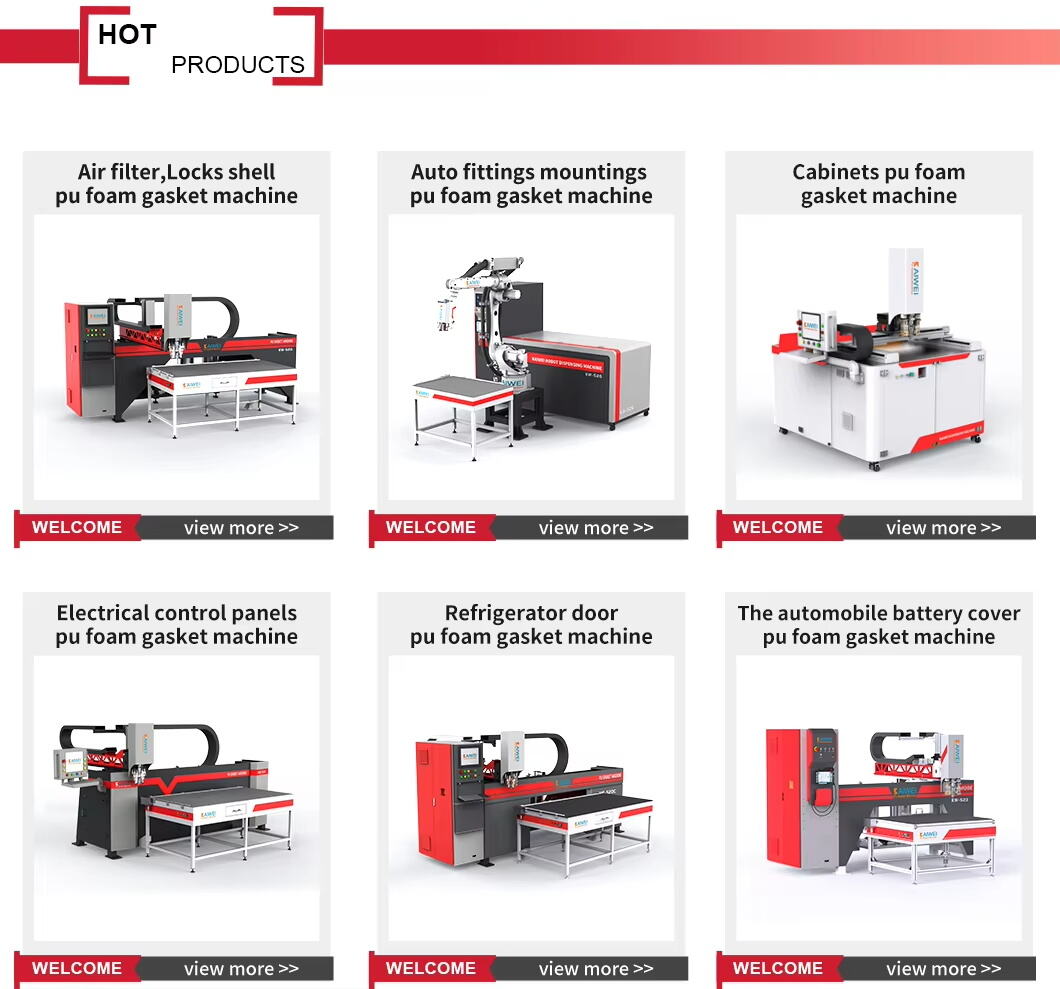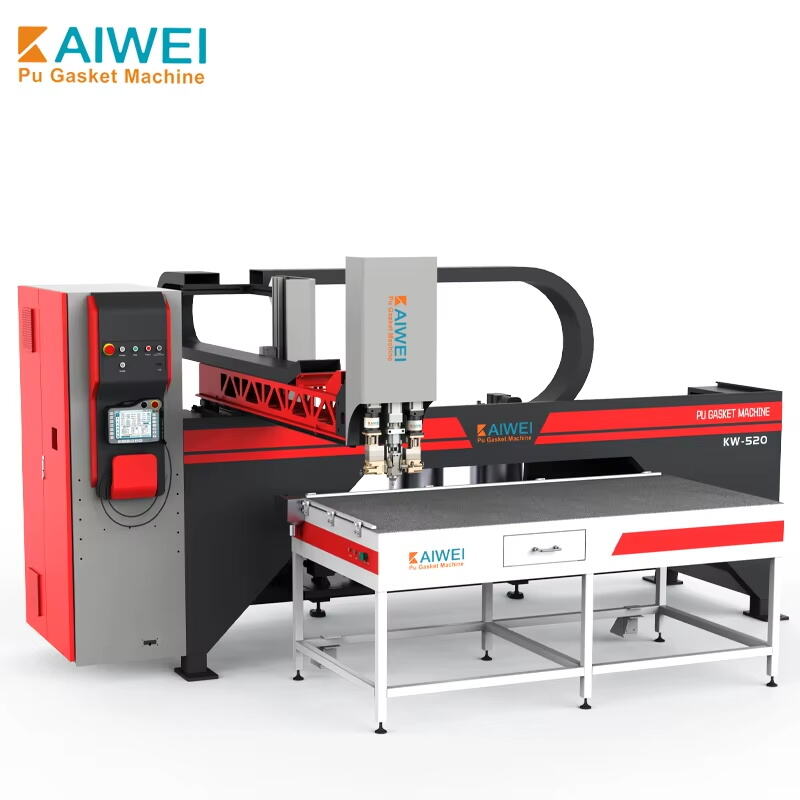הגברת תפוקת הייצור באמצעות טכנולוגיות שטף מתקדמות
בסביבת הייצור התחרותית של ימינו, שיפור יעילות הייצור ושימור סטנדרטים איכותיים גבוהים הם בעלי ערך עליון. מכונות שיפופיות אוטומטיות צמחו לכלי חיוני ששינה את תהליכי החסימה והבידוד בתעשייה מגוונת. המכונות מספקות יישור עקבי של חומרי השטף, מפחיתות פסול ופחת את עבודת היד, מה שמוביל לשדרוג כללי ביכולות הייצור. שילוב של מכונות חסימה בשורות הייצור מציע לייצרנים דרך לענות על דרישות שווקיות עולות תוך אופטימיזציה של ניצול המשאבים ושימור שלמות המוצר.
התפקיד של מכונות שיפופיות אוטומטיות בקידום הייצור
עקרונות של עקביות ודقة בשיפוע
אחד היתרונות העיקריים של מכונות שיפופיות אוטומטיות היכולת שלהן לספק יישור שיפוע עקבי. תהליכי ידניים נוטים לשונות, מה שיכול להוביל לחיבורים חלשים, פגמי מוצר או בזבוז חומרים. מכונות חיברות בשיפוע, באמצעות מנגנוני שליטה מדויקים, מווסתות כי הכמות הנכונה של שיפוע מופזרת בכל פעם, תוך שמירה על עובי ודבקות אחידים.
רמת הדיוק הזו משפרת ישירות את אמינות המוצר ומקטינה את שכיחות החריגה או הפסולת, חוסכת זמן וחומרים. מכונות חיברות בשיפוע יכולות להתאימה לצורות וגדלים שונים של מוצרים, מה שמאפשר לייצרנים להתמודד עם דרישות ייצור מגוונות בצורה יעילה.
מהירות ותנופה לייצור בקנה מידה גדול
מכונות טיחוי אוטומטיות מגדילות משמעותית את מהירות תהליכי החותם והבידוד. על ידי אוטומציה של משימות חוזרות, מאפשרות מכונות אלו הפעלה רציפה עם זמני שקט מזעריים, מה שקריטי להגדלת נפחי הייצור. מחזור העבודה המהיר הזה תומך יצרנים בלהגיע ללוחות זמנים הדוקים ובהרחבת טווח השוק שלהם.
גמישות בסקאלת ייצור היא יתרון חשוב נוסף. מכונות לטיחוי וחותם ניתן לשלב בתוך קווי ייצור בגדלים שונים, מחלקים קטנים ועד ייצור המוני, ומאפשרות ליצרנים להתאים את תפוקת הייצור לדרישות השוק מבלי להקריב את האיכות.
שילוב מכונות חותם טיח בקויי ייצור מודרניים
אוטומציה חלקה וסנכרון תהליכי עבודה
אינטגרציה של מכונות איטום בועות לתוך תהליכי הייצור הקיימים יכולה להגביר את היעילות על ידי יצירת שרשרת תהליכים חלקה. מכונות אלו נועדו לפעול בשילוב עם קונוויירים, זרועות רובוטיות ומערכות בדיקה, תוך אוטומציה של תהליכי טיפול ו assurances איכות.
אוטומציה גם מפחיתה את ההתערבות הידנית, מקטינה את הסיכון לטעויות אנוש ומבטיחה תוצאות עקביות. סינכרון מדויק של מכונת האיטום עם ציוד הייצור האחר ממקסם את throughout וממזער צוואר בקבוק.
התאמה אישית וגמישות בתצורת המכונה
מוצרים שונים דורשים פתרונות איטום ספציפיים, ומכונות איטום בועות מציעות הגדרות ניתנות להתאמה כדי לענות על הדרישות המגוונות הללו. ניתן להתאים פרמטרים כגון גודל הפס הבועתי, מהירות האפליקציה וסוג החומר כדי להתאים את המפרט של המוצר. גמישות זו מבטיחה לייצרנים את היכולת להתמודד עם טווח רחב של משימות איטום מבלי שיהיה צורך בכמה מכונות.
יתרה מכך, מכונות חותמות ספוג תומכות בסוגי ספוג שונים, ביניהם פוליאוריתן, סיליקון ושרף ספוגי, ומספקות גמישות למגוון צרכים תעשייתיים.
שיפור בקרת האיכות ופחת פסול
מערכות שיאור ותגובה בזמן אמת
מכונות איטום מתקדמות כוללות חיישנים ומערכות שיאור שמספקות נתונים בזמן אמת על תהליך האיטום. טכנולוגיה זו מאפשרת לעובדים לזהות סטיות בזמן אמת ולערוך התאמות כדי לשמור על רמות האיכות.
מנגנוני תגובה אלה מפחיתים פגמים, מקטינים עבודה חוזרת ומבטיחים שכל מוצר עומד בדרישות האיטום שנקבעו. גישה זו מובילה לשביעות רצון גבוהה יותר מצד הלקוחות ולפחתת בהפסקות או טענות אחריות.
שיטות עקביות באמצעות שימוש יעיל בספוג
יעילות חומרים היא דאגה מרכזית לייצרנים המבקשים להפחית עלויות ופער סביבתי. מכונות חותמות ספוג אוטומטיות מעדכנות את השימוש בספוג על ידי הפעלת הכמות הדרושה בלבד של חומר, ובכך מפחיתות משמעותית את כמות הפארה בהשוואה לשיטות ידניות.
מעבר לחיסכון בעלות, יישור הספוג המדויק תורם לשיטות ייצור עקביות על ידי הגבלת השימוש הכימי העודף ופחתת דרישות הסילוק.

יתרונות תפעוליים בשימוש במכונות חותמות ספוג
הפחתת עוצמה פיזית וקידום הבטחת העובדים
מכונות חותמות ספוג אוטומטיות מפחיתות את התלות בעבודה ידנית במשימות חותמות, אשר לעיתים קרובות כוללות תנועות חוזרות ונשנות וחשיפה לחומרים כימיים. הפחתה בתפוקת העבודה תורמת למניעת פגיעות במקום העבודה ומשפרת את תנאי הבטחה בכלל.
האופרטורים משתחררים כדי להתמקד בפיקוח, תחזוקה ובקרת איכות, מוסיפים ערך לתפקידיהם ומשפרים את היעילות التشופית. תכונות ביטחון המשולבות במכונות החותמות המותקנות במכונה מגינות על העובדים במהלך הפעלת המכונה.
מזערת את זמני השבתה באמצעות ציוד אמין
ביצועים אמינים הם חיוניים להמשך תהליך הייצור. מכונות חותמות ספוג מותקנות למשיכות ולקלות באחזקה, עם כלים אבחוניים ש מזהים בעיות פוטנציאליות לפני שהן גורמות להפסקת ייצור.
גישה מהירה לרכיבים ופונקציות ניקוי אוטומטיות מקצרות את זמני השירות, ומבטיחות שהקוים לייצור נשארים בתפקוד ויעילים. אמינות זו תורמת לשיעור גבוה יותר של זמני פעילות ותשואה טובה יותר על ההשקעה לייצרנים.
החזונות לעתיד של חותמות ספוג אוטומטיות בתהליך הייצור
אימוץ בשווקים מגוונים
גיוון השימוש במכונות חותמות ספוג הופך אותן ליישום בתעשייה רבה, ובין היתר בתעשייה האוטומобильית, האלקטרונית, הבנייה, האריזה והאנרגיה המתחדשת. ככל שעיצובים של מוצרים נעשים מורכבים יותר וככל שעולים דגש האיכות, חותמות ספוג אוטומטיות מציעות פתרון יציב ואמין.
יצרנים בתעשייה צומחת ממשיכים לחקור חומרים אינובטיביים של ספוג ותצורות מכונה כדי לענות על דרישות שווקים משתנים, מה שמרמז על צמיחה מתמשכת בטכנולוגיית חותמות ספוג.
התפתחויות בזך ובאוטומציה
העתיד של מכונות חותמות ספוג נמצא בתכונות אוטומציה מתקדמות ובשילוב אינטיליגנציה מלאכותית. אלגוריתמי למידת מכונה יכולים לדייק את תבניות ההפצה של הספוג על סמך משוב מהמוצרים, וכך להפחית עוד יותר את הפסולת ולשפר את האיכות.
מכונות חותמות ספוג חכמות, המותאמות לאחזקה נבدينة ולשליטה אדפטיבית, יקבעו מדדים חדשים ביעילות הייצור, האמינות וההתאמה האישית.
יתרונות נוספים של מכונות איטום בועות בתהליך הייצור
העצמת קיימום וביצועים של המוצר
מכונות איטום בועות תורמות לא רק לייצור ביעילות, אלא גם ללקימום של המוצר הסופי. יישור הבחילה המתאים מספק בידוד מעולה, בלימת רטט, הגנה מפני לחות ו מזהמים. ביצועים משופרים אלה מאריכים את חיי המוצר ומעמיקים את שביעות הרצון של הלקוחות.
איטום עקבי גם כן מבטיח עמידה בתקני תעסוקה ובטיחות, מה שקריטי לשמו הטוב של החברה וגם לעמידה בדרישות רגולטוריות.
תומך חדשנות וייצור מותאם אישית
מכונות איטום בועות אוטומטיות מאפשרות לייצרנים לחדש על ידי ניסוי עם תבניות בועה ושיטות יישור שונות. גמישות זו תומכת בייצור מותאם אישית, ומאפשרת לעסקים ליצור מוצרים ייחודיים המותאמים לשווקים ספציפיים.
על ידי אימוץ הטכנולוגיות הללו, חברות יכולות להבחין את עצמן ולהגיב במהירות לשינויים בדרישות הצרכן מבלי להתפשר על מהירות הייצור.
שאלות נפוצות
איך מכונות החותם אוטומטיות משפרות את יעילות הייצור?
הן מגדילות את המהירות, מפחיתות פסול, מספקות יישור א униיפורמי ומקבלות את עבודת היד, מה שמוביל ליעילות גבוהה יותר ואיכות מוצר טובה יותר.
אילו סוגים של חומרי חותם ניתן להשתמש במכונות חותם הפס?
חומרים נפוצים כוללים פוליאוריתן, סיליקון ושרף אפוקסי, שניתן לבחור על פי דרישות התעשייה והמוצר הספציפיות.
האם ניתן לשלב בקלות מכונות חותם פס בשרשראות הייצור הקיימות?
כן, לרוב המכונות מותאמות לשילוב חלק עם מסועים, רובוטיקה ומערכות בקרת איכות כדי למקסם את זרימת העבודה.
אילו פעולות תחזוקה מבטיחות ביצועים אופטימליים של מכונות חותם הפס?
ניקוי שגרתי, בדיקות תורנות, והשימוש בכלים אבחוניים לצורך תחזוקה חזוּית עוזרים לשמור על פעילות יעילה של המכונות ומצמצמים את זמני העצירה.
תוכן העניינים
- הגברת תפוקת הייצור באמצעות טכנולוגיות שטף מתקדמות
- התפקיד של מכונות שיפופיות אוטומטיות בקידום הייצור
- שילוב מכונות חותם טיח בקויי ייצור מודרניים
- שיפור בקרת האיכות ופחת פסול
- יתרונות תפעוליים בשימוש במכונות חותמות ספוג
- החזונות לעתיד של חותמות ספוג אוטומטיות בתהליך הייצור
- יתרונות נוספים של מכונות איטום בועות בתהליך הייצור
- שאלות נפוצות

